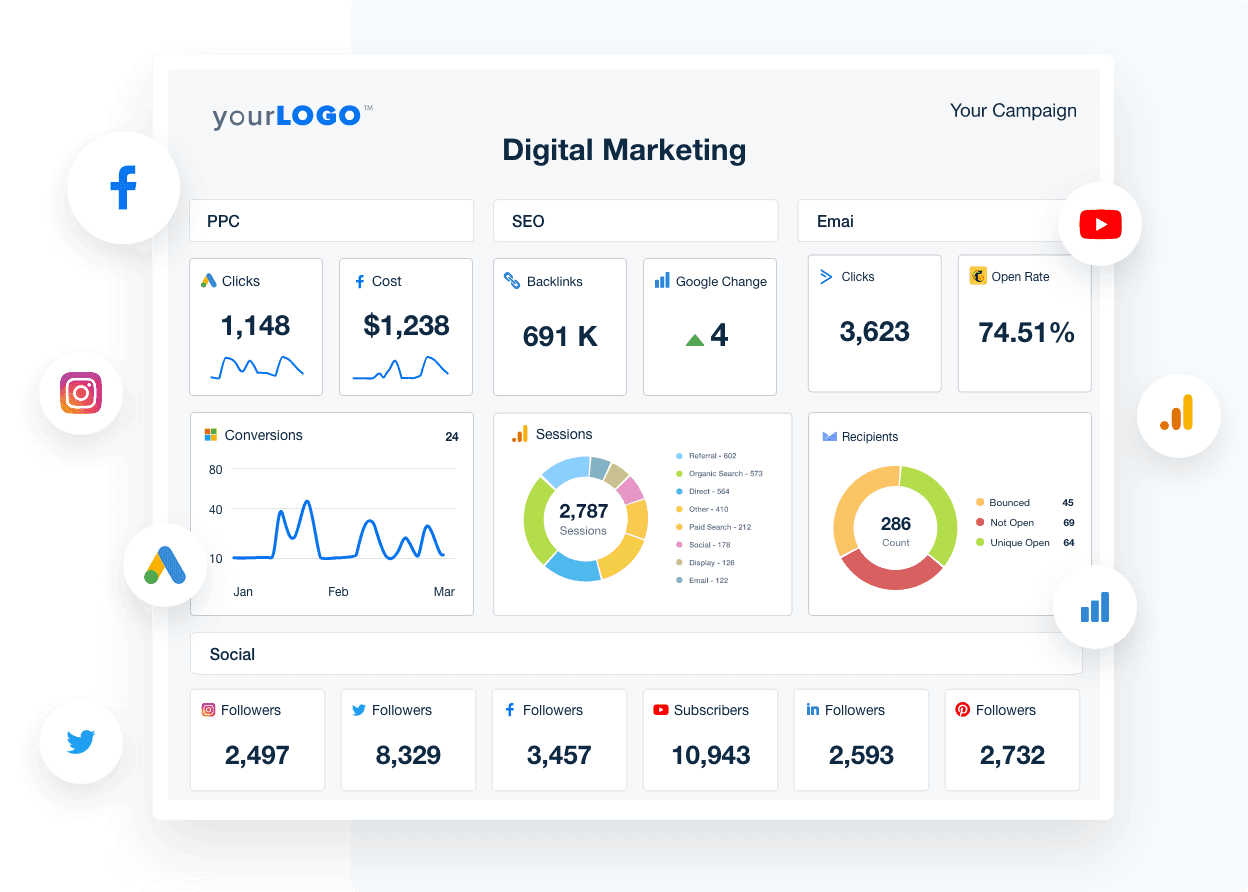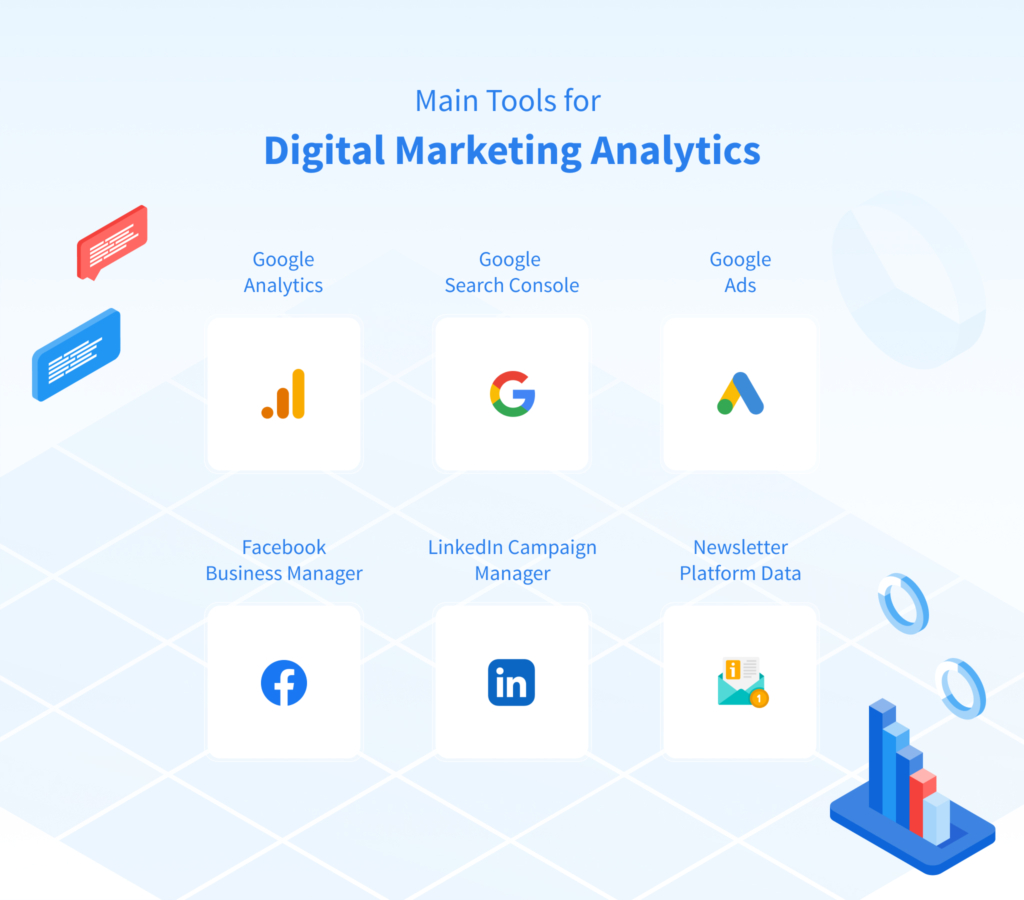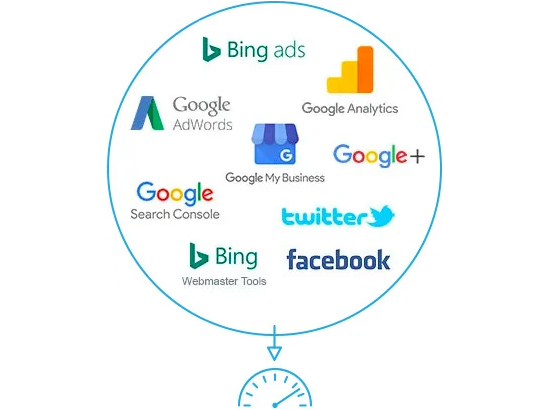Digital marketing analytics tools are essential for every marketer. They help track and analyze performance.
Without these tools, making data-driven decisions becomes difficult. Understanding customer behavior is crucial in today’s digital age. Digital marketing analytics tools provide insights into how campaigns perform. These insights help optimize strategies for better results. They track various metrics like website traffic, social media engagement, and conversion rates.
By analyzing this data, marketers can identify trends and patterns. This enables them to make informed decisions and improve their marketing efforts. In this blog post, we will explore the importance of these tools. We’ll discuss how they can benefit your marketing strategy. Stay tuned to learn more about the best digital marketing analytics tools available.
Introduction To Digital Marketing Analytics
Digital marketing analytics tools are essential for tracking your online campaigns. These tools help you understand user behavior and measure performance. They provide insights into what works and what doesn’t. By leveraging these tools, you can make data-driven decisions to improve your marketing strategies.
Importance Of Analytics
Analytics are crucial in digital marketing for several reasons:
- Understanding Audience: Analytics help you understand your audience’s preferences.
- Measuring Success: They measure the success of your marketing campaigns.
- Identifying Trends: Analytics identify trends and patterns in user behavior.
- Optimizing Campaigns: Use data to optimize and improve your campaigns.
Without analytics, you are flying blind. Data provides a roadmap to success. It tells you where to invest your time and resources.
Roi In Digital Marketing
Return on Investment (ROI) is a key metric in digital marketing. It measures the efficiency of your investments. High ROI means your marketing efforts are paying off. Low ROI indicates areas that need improvement.
| Metric | Importance |
|---|---|
| Conversion Rate | Shows how well your campaign converts leads. |
| Customer Acquisition Cost | Indicates the cost of acquiring a new customer. |
| Customer Lifetime Value | Measures the total revenue from a customer over time. |
Use analytics to monitor these metrics. This helps you maximize your ROI.
Key Metrics To Track
Understanding key metrics is crucial in digital marketing. These metrics help businesses evaluate their strategies. They guide decisions and improve marketing efforts. Let’s explore some essential metrics.
Conversion Rates
Conversion rates show the percentage of visitors who complete a desired action. Actions can be purchases, sign-ups, or downloads. High conversion rates indicate effective marketing strategies.
Here is a simple formula to calculate conversion rates:
Conversion Rate = (Conversions / Total Visitors) 100
Track conversion rates to understand what works best. Optimize your campaigns to increase these rates.
Customer Acquisition Cost
The Customer Acquisition Cost (CAC) measures the cost to acquire a new customer. It includes marketing expenses and sales costs. Lower CAC means higher profitability.
Calculate CAC using this formula:
CAC = Total Marketing and Sales Expenses / Number of New Customers
Monitor CAC to control marketing expenses. Aim to reduce it without compromising quality.
Lifetime Value
Lifetime Value (LTV) predicts the total revenue from a customer over their relationship with your business. A higher LTV indicates loyal and valuable customers.
Use this simple formula to calculate LTV:
LTV = Average Purchase Value x Average Purchase Frequency x Customer Lifespan
Focus on increasing LTV by improving customer satisfaction. Offer excellent service and engage customers regularly.
| Metric | Importance | Formula |
|---|---|---|
| Conversion Rates | Evaluate campaign effectiveness | (Conversions / Total Visitors) 100 |
| Customer Acquisition Cost | Control marketing expenses | Total Marketing and Sales Expenses / Number of New Customers |
| Lifetime Value | Predict customer revenue | Average Purchase Value x Average Purchase Frequency x Customer Lifespan |
Google Analytics
Google Analytics is a powerful tool for tracking and analyzing website traffic. It provides valuable insights into user behavior, helping businesses make informed decisions. With its comprehensive features, Google Analytics is essential for any digital marketing strategy.
Features And Benefits
Google Analytics offers a range of features designed to enhance your understanding of user behavior. Here are some key benefits:
- Real-time Data: Monitor live user activity on your site.
- Audience Insights: Understand your visitors’ demographics and interests.
- Traffic Sources: Identify where your traffic comes from (e.g., organic, paid, social).
- Conversion Tracking: Measure the effectiveness of your marketing campaigns.
- Custom Reports: Create tailored reports to focus on specific metrics.
Setting Up Goals
Goals in Google Analytics help track specific user actions. These actions can include:
- Purchases
- Form submissions
- Newsletter sign-ups
To set up goals:
- Navigate to the Admin section.
- Select the desired view.
- Click on Goals and then New Goal.
- Choose a template or create a custom goal.
- Define the goal details and save.
Once set up, goals provide valuable data on user engagement and conversions.
Tracking User Behavior
Google Analytics excels at tracking user behavior. Key metrics to monitor include:
- Pageviews: Total number of pages viewed.
- Bounce Rate: Percentage of single-page sessions.
- Average Session Duration: Average time spent on the site.
- User Flow: Visual representation of user navigation paths.
These insights help identify areas for improvement. For example, a high bounce rate might indicate a need for better content. Understanding user behavior is crucial for optimizing your website and increasing engagement.

Credit: agencyanalytics.com
Social Media Analytics Tools
In the dynamic world of digital marketing, social media analytics tools are indispensable. They help you understand your audience and measure your campaign’s success. Let’s explore some of the most popular tools.
Facebook Insights
Facebook Insights offers a comprehensive overview of your page’s performance. It provides data on post reach, engagement, and follower demographics. This tool helps you understand what content resonates with your audience.
| Metric | Description |
|---|---|
| Post Reach | The number of people who saw your posts. |
| Engagement | The number of likes, shares, and comments. |
| Follower Demographics | Information about the age, gender, and location of your followers. |
Twitter Analytics
Twitter Analytics provides insights into your tweet performance. It shows data on impressions, engagements, and audience demographics. This tool helps you track trends and optimize your Twitter strategy.
- Impressions: The number of times your tweet appears on users’ timelines.
- Engagements: The total number of interactions (likes, retweets, replies).
- Audience Demographics: Information about the age, gender, and interests of your followers.
Instagram Insights
Instagram Insights offers detailed analytics for your posts and stories. It provides data on reach, impressions, and follower activity. This tool helps you understand which content performs best on Instagram.
- Reach: The number of unique accounts that saw your post.
- Impressions: The total number of times your post was viewed.
- Follower Activity: Data on when your followers are most active.
Using these tools, you can tailor your content to better meet your audience’s needs. Understanding these metrics is key to improving your social media marketing strategy.
SEO Analytics Tools
SEO analytics tools are essential for improving your website’s search engine performance. They help you track key metrics, understand user behavior, and optimize your content. Let’s dive into some of the best SEO analytics tools available.
Google Search Console
Google Search Console is a free tool from Google. It helps you monitor and maintain your site’s presence in Google search results. You can use it to track keyword rankings, identify indexing issues, and view search traffic data.
- Performance Report: Shows clicks, impressions, and average position.
- Coverage Report: Identifies indexing issues and errors.
- Sitemap Submission: Helps Google understand your site structure.
Google Search Console is user-friendly and provides valuable insights for any website owner.
SEMrush
SEMrush is a comprehensive SEO tool. It offers a wide range of features for keyword research, site audits, and competitive analysis. This tool is popular among digital marketers for its depth and versatility.
- Keyword Magic Tool: Generates keyword ideas and trends.
- Site Audit: Identifies technical SEO issues on your site.
- Position Tracking: Monitors your keyword rankings over time.
SEMrush also offers a user-friendly interface and detailed reports. It’s great for both beginners and advanced users.
Ahrefs
Ahrefs is another powerful SEO tool. It specializes in backlink analysis, keyword research, and competitor analysis. Ahrefs is known for its vast database and accurate data.
- Site Explorer: Analyzes your website’s backlink profile.
- Keywords Explorer: Provides keyword difficulty and search volume data.
- Content Explorer: Finds popular content in your niche.
Ahrefs is an excellent choice for improving your site’s SEO performance. Its detailed insights help you stay ahead of the competition.

Credit: nix-united.com
Email Marketing Analytics
Email Marketing Analytics is essential for understanding the success of your email campaigns. It involves tracking various metrics that show how your audience interacts with your emails. These insights help you improve your strategies and achieve better results. Let’s delve into some critical aspects of email marketing analytics.
Open Rates
The open rate is the percentage of recipients who open your email. This metric helps you gauge the effectiveness of your subject lines and the time you send emails. A higher open rate means your subject line caught the audience’s attention.
To improve your open rates, consider the following tips:
- Use personalized subject lines
- Avoid spammy words
- Test different send times
Click-through Rates
The click-through rate (CTR) is the percentage of recipients who clicked on a link within your email. This metric indicates how compelling your email content and call-to-action (CTA) are. A higher CTR means your audience found the content engaging.
To boost your CTR, try these strategies:
- Include clear and concise CTAs
- Use visually appealing buttons
- Ensure mobile-friendliness
A/b Testing
A/B testing involves sending two different versions of an email to a small segment of your audience. You then compare the performance of each version. This technique helps you determine which elements resonate best with your audience.
Common elements to test include:
- Subject lines
- Email design
- CTA placement
By continuously testing and refining your emails, you can enhance overall performance and achieve better results.
Marketing Automation Tools
Marketing automation tools help streamline and optimize your marketing tasks. These tools save time and enhance productivity. They help manage campaigns, track performance, and engage with customers. Below are three popular marketing automation tools.
Hubspot
HubSpot is a popular marketing automation tool. It helps businesses grow by managing and automating marketing tasks. HubSpot offers a variety of features including:
- Email marketing: Create, send, and track emails.
- Lead management: Capture and nurture leads.
- Analytics: Measure the performance of your campaigns.
HubSpot is user-friendly. It integrates with other tools. This makes it a great choice for businesses of all sizes.
Marketo
Marketo is another top marketing automation tool. It is known for its powerful features. Marketo helps businesses with:
- Lead nurturing: Engage and convert leads.
- Campaign management: Plan and execute marketing campaigns.
- Personalization: Create personalized content for your audience.
Marketo is robust and scalable. It suits medium to large businesses. Its advanced features make it a strong contender in the market.
Pardot
Pardot is a marketing automation tool by Salesforce. It focuses on B2B marketing. Pardot offers several features:
- Lead scoring: Prioritize leads based on their engagement.
- Reporting: Analyze the success of your campaigns.
- CRM integration: Seamlessly integrate with Salesforce CRM.
Pardot is ideal for B2B businesses. It helps align marketing and sales efforts. Its integration with Salesforce is a major advantage.

Credit: www.milestoneinternet.com
Choosing The Right Tool
Choosing the right digital marketing analytics tool can be overwhelming. It’s essential to find a tool that fits your specific needs. Below, we break down the key considerations to help you make an informed choice.
Budget Considerations
Your budget plays a crucial role in selecting the right tool. Not all tools are created equal, and prices can vary widely. Here are some questions to ask:
- What is your monthly or yearly budget for digital marketing analytics?
- Are there any hidden costs like add-ons or premium features?
- Is there a free trial or a freemium version?
Here’s a quick comparison table to help you understand different pricing models:
| Tool | Pricing Model | Free Version |
|---|---|---|
| Google Analytics | Free | Yes |
| Adobe Analytics | Subscription | No |
| SEMrush | Subscription | Yes |
Business Needs
Your business needs should guide your choice of a digital marketing analytics tool. Ask yourself:
- What metrics are most important to my business?
- Do I need advanced features like predictive analytics or customer segmentation?
- How many users will need access to the tool?
Consider your business goals and objectives. A tool that aligns with your goals can provide more actionable insights.
Ease Of Use
A user-friendly tool can save you time and reduce frustration. Here are some factors to consider:
- Is the user interface intuitive and easy to navigate?
- Does the tool offer tutorials or customer support?
- Can you easily integrate the tool with your existing systems?
Test the tool if possible. A free trial or demo can give you a feel for the user experience.
Maximizing Roi With Analytics
Digital marketing analytics tools are essential for businesses. They help track and measure campaign performance. By using these tools, companies can ensure that their marketing efforts yield the best return on investment (ROI). Below, we explore how analytics can maximize ROI through various strategies.
Optimizing Campaigns
Analytics tools provide detailed insights into campaign performance. Businesses can identify which ads perform best and which ones need improvement. This data helps in making informed decisions.
- Track click-through rates (CTR)
- Measure conversion rates
- Analyze customer engagement
By optimizing campaigns based on these metrics, companies can allocate resources more effectively. This leads to better results and higher ROI.
Personalization Strategies
Personalization is key to engaging customers. Analytics tools help in understanding customer behavior and preferences. This data can be used to create tailored marketing messages.
For example, segmenting audiences based on their interests allows for personalized content delivery. This increases the likelihood of conversions.
| Metric | Action |
|---|---|
| Customer Demographics | Create targeted ads |
| Purchase History | Offer personalized discounts |
| Browsing Behavior | Recommend relevant products |
Continuous Improvement
The digital marketing landscape is always changing. Continuous improvement is crucial for staying ahead. Analytics tools provide ongoing insights into campaign performance.
- Monitor key performance indicators (KPIs) regularly
- Adjust strategies based on data trends
- Implement A/B testing to find the best approaches
By using these strategies, companies can refine their marketing efforts. This results in better performance and a higher ROI.
Future Trends In Marketing Analytics
The future trends in marketing analytics are rapidly evolving. Marketers are adopting advanced tools to stay ahead. These tools provide deeper insights and more accurate predictions. Let’s explore the emerging trends shaping the future of marketing analytics.
Artificial Intelligence
Artificial Intelligence (AI) is transforming marketing analytics. AI algorithms analyze vast amounts of data quickly. They identify patterns and trends that humans might miss. AI helps in making real-time decisions. It automates repetitive tasks, saving time for marketers. AI-powered chatbots enhance customer interaction. They provide personalized recommendations and support. AI also aids in content creation and optimization. It ensures content reaches the right audience at the right time.
Predictive Analytics
Predictive analytics leverages historical data to forecast future trends. It helps marketers anticipate customer behavior. This allows for more targeted marketing strategies. Predictive analytics tools analyze past interactions. They predict future actions, such as purchases or churn. Businesses can tailor their campaigns to individual customers. This increases customer retention and satisfaction. Predictive analytics also optimizes budget allocation. Marketers can invest in channels with the highest expected ROI.
Data Privacy
Data privacy is a growing concern in marketing analytics. Regulations like GDPR and CCPA mandate strict data handling practices. Marketers must prioritize customer consent and data protection. Transparency in data collection builds customer trust. Ensuring data privacy enhances brand reputation. Businesses need to adopt secure data storage and processing methods. They should also provide customers with control over their data. Compliance with privacy laws is not just a legal requirement. It is essential for maintaining customer relationships.
These trends are shaping the future of marketing analytics. Embracing them will help businesses stay competitive. Adopting AI, predictive analytics, and ensuring data privacy are key steps. They enhance decision-making, improve customer experiences, and protect data integrity.
Frequently Asked Questions
What Are Digital Marketing Analytics Tools?
Digital marketing analytics tools track and analyze online marketing performance. They provide insights into website traffic, user behavior, and campaign effectiveness.
Why Use Digital Marketing Analytics Tools?
These tools help optimize marketing strategies. They offer data-driven insights, helping businesses improve ROI and make informed decisions.
Which Are Popular Digital Marketing Analytics Tools?
Popular tools include Google Analytics, SEMrush, and HubSpot. They offer various features for tracking and analyzing marketing performance.
How Do Analytics Tools Improve Marketing Strategies?
Analytics tools identify strengths and weaknesses in campaigns. They help refine strategies, target audiences better, and increase overall efficiency.
Conclusion
Digital marketing analytics tools are essential for understanding campaign performance. They help track metrics and make informed decisions. Using these tools, businesses can improve strategies and boost engagement. Choose the right tool that fits your needs and budget. Stay updated with new trends and features.
This will keep your marketing efforts effective. Embrace the power of data for better results. With the right tools, you can achieve your marketing goals. Happy analyzing!

